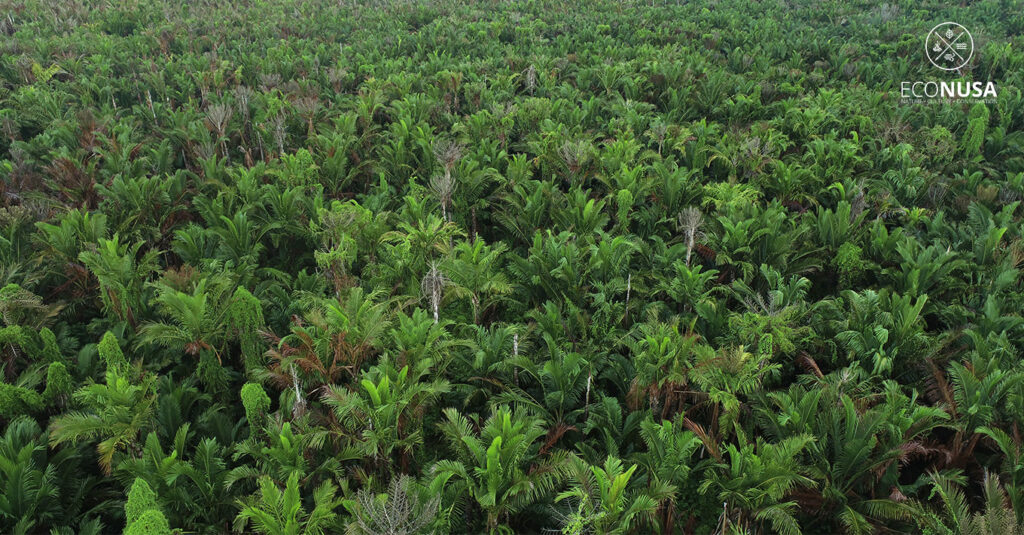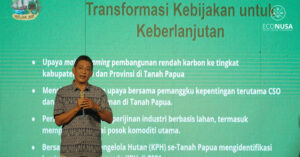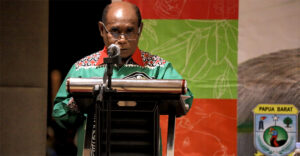
Natural richness in Tanah Papua provides abundance to anyone that protect them. This is wat Billy Tokoro, the founder of Pace Kreatif, who tries to utilize sago forest as ecotourism. Billy is the local youngster of Yoboi Village in Jayapura, Papua. With his Pace Kreatif’s pals, Billy assigned a certain area at sago village to give an added value.
He worked jointly with the community that has acquired awareness on environmental protection and conservation. Ecotourism performed by Pace Kreatif makes use of the local social and cultural values to raise economy. This is based on the Pace Kreatif’s motto as saying “Getting Money from Protecting Land”.
“Yoboi Village is known with the ample sago trees. More than 1,000 hectare plots of land are sago forest,” said Billy in a Live Instagram event entitled Role of Indigenous Community to Protect Environment organized by Catch Me Up! and EcoNusa on 18 May 2022.
Sago
Yoboi Village has been transformed into an ecotourism village. It is located at the center of Sentani Lake. Tourists should go across Sentani Lake to enjoy sago tourism as the magnet of the ecotourism village. There are 20 types of sago trees here. Besides, trekking 420 meters of sago trees track is also the fascinating point.
Read also: Sago Forest Under Palm Oil Threat
In Yoboi tourism village, the visitors could also enjoy creative economy products made from sago. For instances, sago-made ice cream, grilled sago, sago powder. The village has even sold Papuan batik, woven bag made of sago tree, curtain made from sago fruit.
Yoboi tourist village is on the top 50 on Tourist Village Award (ADWI) 2021. The Ministry of Tourism and Creative Economy held an award to lure tourism which gives people benefit.
Before performing ecotourism activity, Billy and his friends consulted with the ondoafi (tribal chief). All issues related to land and public interests should be done upon consulting with the ondoafi. The tribal chief was elected on the basis of local capacity to defend tradition and environment. This is evidently showed the role of indigenous people to protect and conserve their environment.
Read also: Plant Sago, Plant the Future
Yoboi tourist village has natural beauty, culture diversity, and education tourism as the main enticement. It is no wonder that Yoboi has become one of the popular tourism destinations in Papua. In addition, the community has strongly protected the tradition and ancestors culture. As the indigenous community, they protect the sustainability of sago as it also serves as the food security stock.
Protection of Indigenous Rights
The indigenous community in Tanah Papua considers forest as their mother that needs affection and protection. According to the EcoNusa’s Policy and Advocacy Manager, Cindy J. Simangunsong, the indigenous people has mutual relationship with forest. Forests have provided various necessities such as food, medicine, and protection in case of disaster. They utilize forest by taking what they need appropriately.
“Unfortunately, forests that serve as the source of livelihood of the indigenous people are often changed into concession without any prior consent,” said Cindy. Data delivered by Cindy showed that West Papua Province has 9.8 million hectares of forests of which 4.6 million hectares are the concessions consisting of Forest Concession Rights (HPH), Industrial Forests (HTI), mining, and palm oil. Meanwhile, Papua Province has 31 million hectares of forest of which 8.3 million hectares are concessionaires.
Read also: Handing West Papua Forests Back to Titleholders
Concession given to large scale industries and changed forest function could marginalize the indigenous people from their sources of livelihood. Cindy highlighted that the customary land mapping could be legalized in such a way that the indigenous people as citizens have assurance and protection from the state.
EcoNusa tries to help people defend their indigenous rights for their environment in many ways. Some of them is done by preparing the grassroot by building the capacity of indigenous people, participatory mapping, and empowerment of cultural value in environmental protection.
In the context of policy making, EcoNusa attempts to assist the process of customary area and indigenous people, natural resources management, and monitor the customary-based development planning. Besides, through various social media channels, EcoNusa tries to build positive narrative and good stories of Tanah Papua.
Editor: Leo Wahyudi & Lutfy Putra




